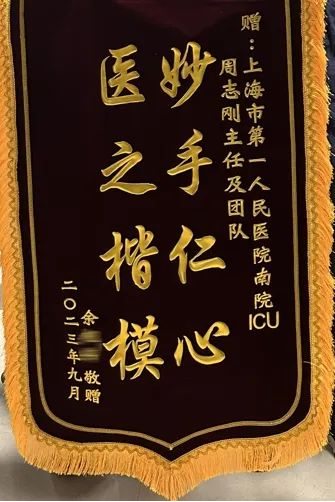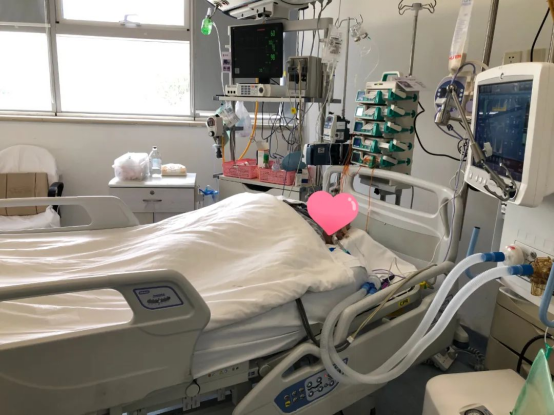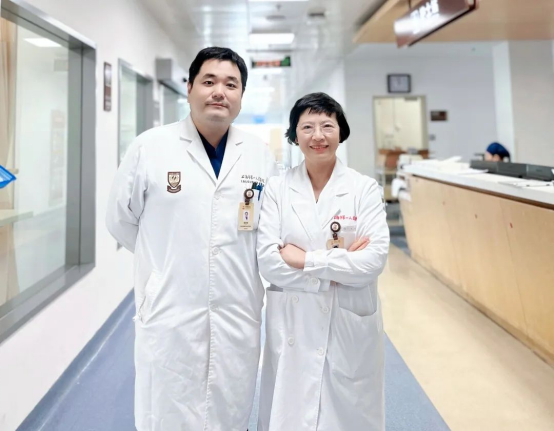- News
A Patient With Severe Pneumonia Was Brought Through After 60 Days and Nights of Meticulous Medical Treatment
https://mp.weixin.qq.com/s/7uByPMXUDV7xZKrai25ZIQ
Severe pneumonia is a very dangerous disease especially for elderly patients with underlying diseases whose targeted treatment is extremely difficult. In order to save the life of an elderly patient with severe pneumonia, our emergency intensive care unit overcame various complex infection difficulties within two months, resolved emergency situations several times, and finally successfully helped the patient recover and be discharged.
“Thank you, Doctor Zhou. It was your responsibility, dedication, and best efforts that saved Mr. Yu.”

The other afternoon, Mr. Yu, a former severe pneumonia patient, and his family arrived at the southern ICU of our hospital. Yu walked with agile steps and a flushed face, holding a banner in his hand. It was completely impossible to tell that he had been critically ill several months ago. Yu's family said, "The more we recall the moment when Yu’s life was on the line, the more grateful we are to Dr. Zhou Zhigang's team from the ICU of Shanghai General Hospital for their superb medical skills, responsible attitude, and careful protection.". As the old man spoke, the corners of his eyes gradually moistened and he kept folding his hands together. This is a story of treating severe pneumonia with love, responsibility, trust, dedication and perseverance.
One day this year, Yu suddenly coughed and had a fever. As a result, he took antiviral medication at home for 5 days on his own. However, not only did he not feel better, but instead, chest tightness and shortness of breath gradually worsened, and his finger pulse oxygen saturation was even less than 80% (over 95% in normal people). So Yu immediately rushed to the nearby hospital for hospitalization and treatment. After receiving targeted treatments such as antiviral and oxygen therapy, Yu's condition still did not improve significantly. He was later urgently transferred to the emergency department of our hospital, and his chest CT showed severe pneumonia in both lungs. In order to receive better treatment, Yu was transferred to the ICU ward then.
Yu's heart rate reached to 100 beats per minute and his respiratory rate was as high as 35 beats per minute. Even in the state of high flow mask oxygen absorption, his oxygen saturation was only 92%, and his overall state is very poor. The auscultation results showed that the respiratory sounds in both lungs were rough, especially wet rales could be heard in the lower lungs, indicating that both lungs were diseased and respiratory failure occurred, posing a life-threatening risk at any time.
Deputy chief physician Zhou Zhigang who was on duty that day immediately arranged high flow oxygen inhalation and prone position ventilation for Yu in a conscious state. At this point, the examination results also came out, and the preliminary diagnosis was severe pneumonia. Zhou immediately issued a medical order, providing a series of targeted treatments such as anti infection, antiviral, and immunoglobulin to enhance immunity. The next morning, Yu's situation improved slightly. At the entrance of the ICU, Zhou explained Yu’s condition in detail to the family of Yu with the examination results in his phone. Just as he was about to return to the ward, Yu's family held his hand and begged, "Doctor, please help him." Zhou replied, "We will do our best to treat him!"

Two days later, Lao Yu's condition turned unstable. Progressive decrease in oxygen saturation, recurrent high fever, decreased blood pressure, increased sputum production, his life was at risk. Zhou’s team fully evaluated the condition and considered that it may be due to the patient's extremely low immune system that led to secondary drug-resistant bacterial infection. The laboratory results also showed that Yu was infected with a drug-resistant bacterium called MRSA. Zhou’s team immediately adjusted the antibiotic regimen. In the following days, Yu's began to recover.
In the following month, Yu's condition fluctuated like a roller coaster, often relapsing shortly after the previous high fever was controlled. Zhou’s team carefully identified the causes of high fever based on the development of the condition and adjusted the treatment plan in a timely manner.
One morning, nearly two months after Yu was admitted to the hospital, Doctor Zhou carefully reviewed each test sheet during a ward round and said, "The last three sputum cultures have been negative. Yu was successfully brought through by us." Four days later, Yu's condition stabilized. H His temperature was normal, and he gradually stopped using antibiotics and ventilators. Nearly a week later, Yu was successfully discharged from the hospital.

![]()
▲ Deputy Chief Physician Zhou Zhigang and his supervisor Professor Wang Ruilan
"My mentor Professor Wang Ruilan reminds us that as a doctor in the field of critical care, we face critically ill patients with different conditions and unexpected treatment difficulties every day. Only with a dedicated heart can we move forward courageously. Critical care doctors must overcome various difficulties, be brave and meticulous, and spare no effort to treat every critically ill patient. It is our duty and honor as critical care doctors to implement every treatment with respect and awe for life, and to strengthen the hope that patients can survive!"said Zhou in a hoarse voice.
Everyone hopes to live a healthy life. Illness is an unexpected hardship that may disrupt the pace of work and life, but it can also make people stop and re-examine the meaning of life. Many patients or family members may have forgotten the initial pain and confusion when they recall the time when they fell ill and sought medical treatment many years later, only remembering the touching beauty. We hope that the warmth and kindness from hospitals and doctors can be transmitted and replicated, allowing the fragrance of love to overflow the world. We also send a greeting to every patient: thank you for your trust, and wish you a speedy recovery!
